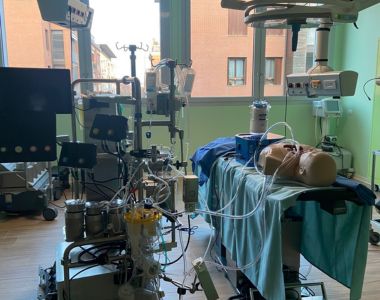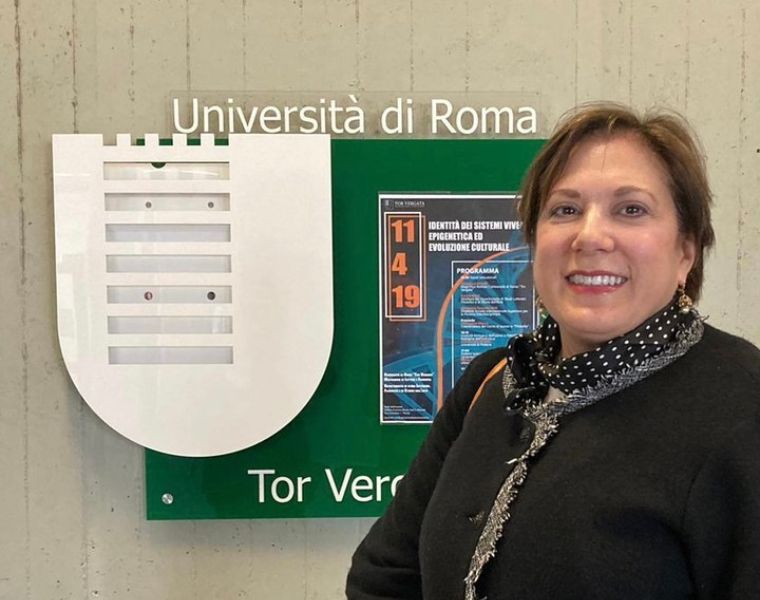Each year, thousands of people participate in the U.S. Department of State’s Fulbright programs, prestigious appointments through which students, scholars, educators and other professionals come together to engage in a global exchange of knowledge. A variety of Fulbright programs are offered, each with their own aims and time requirements. In recognition of International Education Week, celebrated Nov. 13–17, The Daily will share the stories of some of Case Western Reserve University’s most recent Fulbright recipients each day this week.
Celeste M. Alfes, a professor and assistant dean of academic affairs at Frances Payne Bolton School of Nursing, visited Italy earlier this year as part of the Fulbright Specialist Program. This program sends professionals and academics abroad for project-based opportunities at host institutions on a shorter timeframe than some of the other Fulbright programs.
Alfes’ project took place at the University of Rome Tor Vergata—a public research university with 35,000 students—and was an extension of her work as the former director of the Center for Nursing Education, Simulation, and Innovation at Case Western Reserve. Titled “Simulation to Improve Health Care in Populations Affected by Chronic Conditions,” her project allowed her to consult with university representatives to enhance their simulation center and suggest approaches for interdisciplinary uses.
During her project, Alfes collaborated with six nursing faculty members and 92 PhD students.
Read more about her experience in the program.
Answers have been lightly edited for length and clarity.
1. What motivated you to apply for a Fulbright Specialist award, and how did you choose your specific research or teaching destination?
In 2019, during a 12-week visiting professorship at the University of L’Aquila School of Nursing in Abruzzo, Italy, I was introduced to many nursing professors from the University of Rome Tor Vergata School of Nursing. Those introductions turned into collaborations on several projects, which became the impetus for applying for a Fulbright Specialist position with the University of Rome Tor Vergata as my host institution.
Since 2019, my collaborations with nursing colleagues in Italy have focused on providing consultation on the development and best practices for academic programs and the delivery of interprofessional education to support the advancement of simulation science, research and publications.
2. Can you share your experiences during the application process, including the key components of a successful Fulbright Specialist proposal?
My experience during the application process was very positive. Due to my previous collaborations with the University of Rome Tor Vergata, I was able to work directly with their faculty to design a Fulbright Specialist proposal.
The University of Rome Tor Vergata, as the host institution developed the project proposal and listed me as their preferred Fulbright Specialist for the project. Given that I was already on the Fulbright Specialist Roster, the matching process was streamlined, and their project was funded with myself as their designated specialist. Although I was awarded the Fulbright Specialist assignment in 2021, my travel was delayed until January of 2023 due to COVID and international travel limitations.
3. How does receiving a Fulbright award align with your research or teaching goals, and what impact do you anticipate it having on your academic career?
As director of the Center for Nursing Education, Simulation, and Innovation at Frances Payne Bolton School of Nursing from 2004–21, I had the opportunity to work with [nursing] faculty and industry leaders to make significant contributions pioneering simulation training, including the development of North America’s first high-fidelity helicopter simulator adapted for flight nurse training within [the nursing school’s] Dorothy Ebersbach Academic Center for Flight Nursing. The Fulbright Specialist assignment was the perfect program to expand our simulation efforts internationally. Dean Carol Musil has been extremely encouraging of my simulation initiatives globally.
The visiting professor position at the University of L’Aquila in 2019 coupled with my Fulbright Specialist position at the University of Rome Tor Vergata helped to establish my international impact as a simulation leader. During my four years collaborating with nursing colleagues from Italy, I was co-author on six peer-reviewed manuscripts and two book chapters and delivered dozens of podium presentations throughout Italy. These achievements were instrumental in my promotion to professor in July 2021.

Moreover, the relationships continue and opportunities for signing mutual agreements of understanding between the two institutions have been discussed and would provide the opportunity for future faculty exchanges and potential study abroad opportunities for our nursing students.
4. Were there any challenges in adapting to a new academic and cultural environment, and how did you address them?
Lodging had to be arranged ahead of time and although near the Vatican in Rome, travel to the university was 45 minutes by bus, which tended to be challenging and tiring. Luckily, I had some Italian nursing colleagues in Rome who were able to provide me with a ride to the campus on several occasions.
5. What advice do you have for other faculty members who are considering applying for Fulbright Specialist awards in the future?
I highly recommend visiting the Fulbright Specialist website and reviewing the application process. Faculty can begin by working to complete the application. Those individuals who have been approved to join the Fulbright Specialist Roster are placed on the Fulbright Specialist Roster for a three-year tenure as a Fulbright Specialist Candidate, during which time they are eligible to be matched with approved projects designed by foreign host institutions from over 150 countries and other areas.
Certainly, getting the support of your dean or chair is necessary and choosing a project that will support your advancement as well as enhance your department or school is essential.
Lastly, I recommend working with our international office and a faculty person who has received a Fulbright to guide you in completing a successful application.

